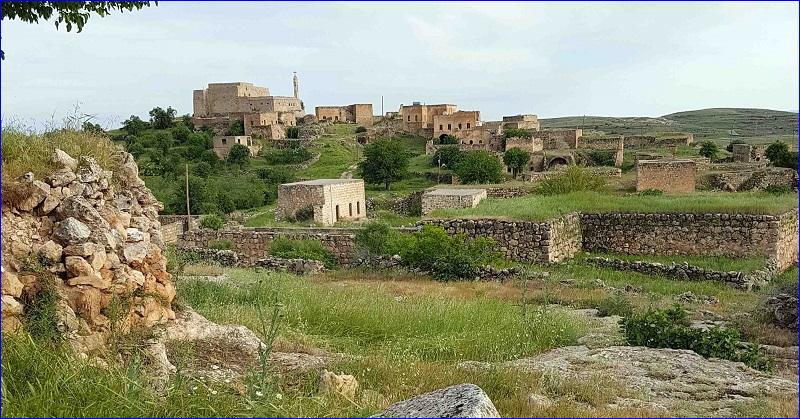


The report is titled Safety Of The Life Of Nun Verde Gökmen In The Village Zaz (Izbirak) -- Midyat, Tur Abdin - And The General Social Situation Of The Assyrian Villages In The Region.
Commission members of IHD visited the village of Zaz in July 2017 and in September 2018. During their first trip they also visited nine other Assyrian villages in the region and spoke with the villagers, pastors and mayors, as well as the authorities in charge in the region.
With regards to the situation of the Nun, the commission met with the village mayor Feyzullah Aslan and the Commander of Anıtlı Police Station, Senior Sergeant Kadir Altintaş. In addition, they also conducted telephone conversations and correspondence with Isa Acan, president of the Zaz Village Association in Hamburg, Germany.
Related: Assyrian Nun Valiantly Stands Guard Over 1,500-year-old Church in Turkey's Southeast
Ayşe Günaysu, member of the IHD's Commission met with Nun Verde Gökmen three times, and despite the reports she wrote and initiated in the Turkish press about her situation, nothing has changed. In fact, the threats against the nun have increased.
With respect to the Nun's situation, the commission said:
Nun Verde Gökmen, who lives in the 1500-year-old Mor Dimet Church, has been harassed and threatened for many years. Various methods are being tried to terrify her: Unidentified people come to the church door with vehicles and wait for long hours, sometimes shouting 'Allahu-Akbar' while punching the door, sometimes insulting the Nun directly, and on other times, threatening to kill her in case she doesn't leave the church and the village. All of the complaints the Nun has made to the respective authorities were inconclusive due to the lack of evidence, as no one is willing to testify to these incidents.
Rights violations in the Assyrian villages
The issue of rights violations in the Assyrian villages of Dayro da Slibo (Çatalçam), Derkube (Karagöl), Haẖ (Anıtlı), Der-H̱adad (St. Aho Monastery), Bsorino (Haberli), Sare (Sarıköy) and Kafro (Elbeğendi) in Tur Abdin is almost identical in all of the villages which were visited, by the commission alongside Zaz, says the report. The commission underlines its finding based on interviews with the Assyrian villagers, some of them returnees from Europe, who migrated to various European countries after the evacuation of their villages in the 1990s. They returned in the early 2000s, benefiting from the call of the government to take advantage of the "Return to the Village" law (Köye Dönüş Yasası). Quickly they felt that they are "not particularly welcomed by the Muslim population, especially the Kurdish tribes in power," in the region, states the report.
According the report:
there have been and are experienced cases of occupation on immovable property such as houses, fields, land, pastures, vineyards and gardens. It is observed that the officials who came for the land registry and cadastral inspection operations were sometimes threatened by armed tribal members, sometimes 'persuaded', and that the cadastral transactions were concluded in favor of the occupiers. The lawsuits were delayed, either during the modernization of the land registry records in the same period, or in cases after filing lawsuits where various methods, such as intimidation, threat or accommodation of profit are used in dealing with the officers appointed by the court. Fields and land were passed over to the invaders.
Hostility towards returning Assyrians continues in the region, confirms the report. The commission's assessment is that the source of this situation derives from the "the Assyrian Genocide in 1915, when Assyrians were separated from their homeland, and that those who tried to claim their history and ancestral lands were subjected to various violations of rights, including threats, harassment and intimidation."
Related: The Assyrian Genocide
Cultural heritage is being destroyed
Assyrian churches, monasteries and their ruins have invaluable historical and cultural value in the region and "they are constantly exposed to the destruction of treasure hunters while Assyrian cultural heritage is being destroyed," says the report.
The commission concludes their report with recommendations related to both, the Nun's situation in the village of Zaz and concerning the Assyrian villages, formulating specific statements addressing authorities. In relation to the villages, the commission proposes that:
For this purpose, a commission consisting of property supervisors, regional/ provincial/ district directorates of the relevant ministries, Land Registry Cadastre officials, and security officials should be established. This commission should meet with Assyrian villagers and identify the problems. In discussions with the elders of the tribes, who are the perpetrators of the rights violations, it should be decisively stated that the state stands with the victims of the rights violations. In this context, and particularly for Zaz, a strong message should be given by the state to the neighboring village Ortaca as well as to the Aslan family and the Mukhtar Feyzullah's brother, who is causing severe problems to the Assyrians of Zaz, that the state will ask for accountability of all kinds of harassment, insults, threats against the Nun, and that these will not end in impunity.

or register to post a comment.